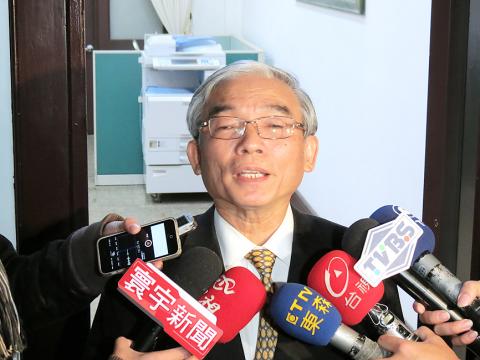The Ministry of Justice announced yesterday the removal of Taiwan High Prosecutors’ Office head prosecutor Chen Shou-huang (陳守煌) for alleged involvement in an improper lobbying case involving Legislative Speaker Wang Jin-pyng (王金平).
The Executive Yuan approved the removal yesterday, the ministry said, adding that Chen will be transferred to the Supreme Prosecutors’ Office.
The ministry said the removal came after an investigation by the ministry’s Prosecutor Evaluation Committee, which reached a decision on Saturday last week. The committee said Chen was involved in the lobbying case and that it recommended he be given an administrative reprimand.

Photo: CNA
The committee said Prosecutor-General Huang Shih-ming (黃世銘) gave the green light to Special Investigation Division (SID) prosecutor Cheng Shen-yuan (鄭深元) to apply for a wiretap on subjects unrelated to any open investigations.
Huang also approved the production of a transcript of a wiretapped conversation, which was used when the SID reported possible misconduct on Sept. 6, based on a conversation it overheard between Wang and Democratic Progressive Party caucus whip Ker Chien-ming (柯建銘).
In the conversation, Wang and Ker discussed lobbying then-minister of justice Tseng Yung-fu (曾勇夫) and Chen Shou-huang to prevent Taiwan High Prosecutors’ Office prosecutor Lin Shiow-tao (林秀濤) from appealing Ker’s acquittal in June in a breach of trust case, the SID said.
The committee said that Huang visited President Ma Ying-jeou (馬英九) with information on an ongoing investigation that was obtained via the wiretaps.
Huang’s action in reporting to the president had no constitutional basis, the committee said, as the Republic of China Constitution does not list the president as the head of the Legislative Yuan, Ministry of Justice or the Executive Yuan.
The committee said Huang and SID section chief Yang Jung-tsung (楊榮宗) have undermined the credibility of the Supreme Prosecutors’ Office, the SID’s superior authority. It recommended that Huang be dismissed and Yang and Cheng be admonished. The trio have been handed over to the Control Yuan.
The committee recommended that Chen Shou-huang and Lin Hsiu-tao be given lighter administrative reprimands, as they are believed to have been forthcoming with their accounts, the committee said.
In response to the ministry’s announcement yesterday, Chen Shou-huang said he respected the ministry’s decision, while insisting on his innocence.
In related developments, a motion to impeach Huang was withdrawn at the last minute on Thursday, delaying a second attempt to remove him for leaking information to the president about his political rival.
The withdrawal does not mean Huang is off the hook, as the Control Yuan member who withdrew the motion, Wu Feng-shan (吳豐山), said he will resubmit it at a later date.
Wu withdrew the motion after some of the nine members present at Thursday’s meeting complained that the committee’s report about Huang’s alleged leaking of information was “not complete” and that they had not received an official copy of the report.
Huang, insisting that it was his duty to disclose cases of improper lobbying involving senior politicians, has vowed to resign if he is impeached by the Control Yuan or found guilty in a first court trial.
He survived the first Control Yuan attempt to impeach him on Nov. 28, when a tied vote defeated the motion.
According to Control Yuan regulations, an impeachment vote needs a clear majority to be passed. An impeachment meeting can be held a maximum of twice against an official for the same charges.
Additional reporting by Rich Chang

Beijing could eventually see a full amphibious invasion of Taiwan as the only "prudent" way to bring about unification, the US Department of Defense said in a newly released annual report to Congress. The Pentagon's "Annual Report to Congress: Military and Security Developments Involving the People's Republic of China 2025," was in many ways similar to last year’s report but reorganized the analysis of the options China has to take over Taiwan. Generally, according to the report, Chinese leaders view the People's Liberation Army's (PLA) capabilities for a Taiwan campaign as improving, but they remain uncertain about its readiness to successfully seize

Taiwan is getting a day off on Christmas for the first time in 25 years. The change comes after opposition parties passed a law earlier this year to add or restore five public holidays, including Constitution Day, which falls on today, Dec. 25. The day marks the 1947 adoption of the constitution of the Republic of China, as the government in Taipei is formally known. Back then the Chinese Nationalist Party (KMT) governed China from Nanjing. When the KMT, now an opposition party in Taiwan, passed the legislation on holidays, it said that they would help “commemorate the history of national development.” That

Trips for more than 100,000 international and domestic air travelers could be disrupted as China launches a military exercise around Taiwan today, Taiwan’s Civil Aviation Administration (CAA) said yesterday. The exercise could affect nearly 900 flights scheduled to enter the Taipei Flight Information Region (FIR) during the exercise window, it added. A notice issued by the Chinese Civil Aviation Administration showed there would be seven temporary zones around the Taiwan Strait which would be used for live-fire exercises, lasting from 8am to 6pm today. All aircraft are prohibited from entering during exercise, it says. Taipei FIR has 14 international air routes and

Snow fell on Yushan (Jade Mountain, 玉山) yesterday morning as a continental cold air mass sent temperatures below freezing on Taiwan’s tallest peak, the Central Weather Administration (CWA) said. Snowflakes were seen on Yushan’s north peak from 6:28am to 6:38am, but they did not fully cover the ground and no accumulation was recorded, the CWA said. As of 7:42am, the lowest temperature recorded across Taiwan was minus-5.5°C at Yushan’s Fengkou observatory and minus-4.7°C at the Yushan observatory, CWA data showed. On Hehuanshan (合歡山) in Nantou County, a low of 1.3°C was recorded at 6:39pm, when ice pellets fell at Songsyue Lodge (松雪樓), a